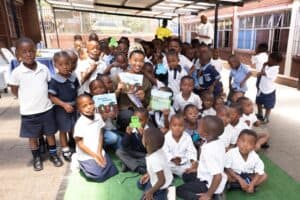Linda Scotson has found yet another way of giving people not only hope, but a way to empower themselves, both here and in her home country.

Scotson has founded a UK-based charity called Advance to teach parents how to apply the massage which is now called the Scotson Technique. In September 2003, Scotson was invited to South Africa by parents of children with disabilities and the SA Institute for the Scotson Technique was formed a year later. The institute is situated on a tranquil, unassuming property in Rivonia, and is a registered non-profit organisation dedicated to providing disabled children with the chance of normal development. It is run by another dedicated mother, Adi de Hoop.
“My daughter was like a blind child,” De Hoop, whose daughter was born with CP, recalls. “When I started using the Scotson Technique, her vision and speech improved. I now have a child who understands what is going on around her and experiences no pain.”
Children living in poor and impoverished communities in South Africa, who have been afflicted with brain abnormalities or injuries such as cerebral palsy have until recently been given no hope of improvement. De Hoop realised that she could work with Scotson to make the Scotson Technique more accessible across South Africa if they could train sufficient instructors. The therapy consists of very gentle controlled breath like pressures.
After visiting the Alexandra Disability Centre, which is run by Angie Mpjana, a dynamic blind woman, they began to toy with the idea that blind people would be the ideal candidates for training.
“Blind people have a very well-developed sense of touch. People often ask me if I can send them a DVD or train them via Skype. However, they need to feel the pressures so this isn’t possible. I often ask parents to shut their eyes while we train,” says Scotson.
Scotson and De Hoop are now hoping to train other blind women in disadvantaged communities as instructors, who will then be able to start their own businesses and train others. The work of these women could be the starting point for empowerment in their communities, especially in areas affected by dire poverty and lack of access to important medical services.
“We can only afford to have two major training sessions in South Africa a year. Imagine if we had 10 women who were trained in the technique.” De Hoop enthuses. “I have started working with Mpjana, and it’s great because she is also able to speak the language that the parents speak.”
Support Local Journalism
Add The Citizen as a Preferred Source on Google and follow us on Google News to see more of our trusted reporting in Google News and Top Stories.








